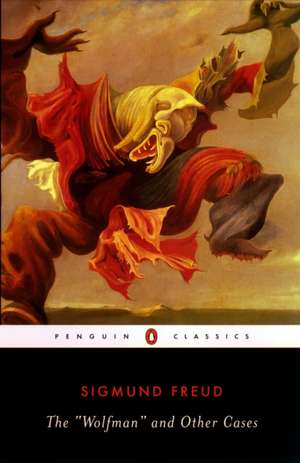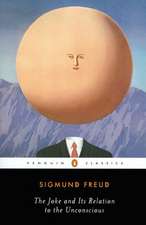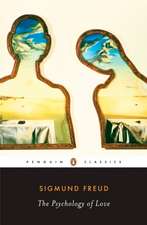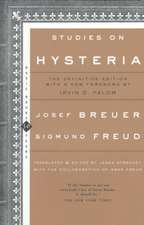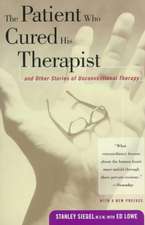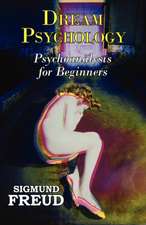The "Wolfman" and Other Cases: Penguin Classics
Autor Sigmund Freud Traducere de Louise Adey Huishen Limba Engleză Paperback – 31 mai 2003 – vârsta de la 18 ani
When a disturbed young Russian man came to Freud for treatment, the analysis of his childhood neuroses—most notably a dream about wolves outside his bedroom window—eventually revealed a deep-seated trauma. It took more than four years to treat him, and "The Wolfman" became one of Freud's most famous cases. This volume also contains the case histories of a boy's fear of horses and the Ratman's violent fear of rats, as well as the essay "Some Character Types," in which Freud draws on the work of Shakespeare, Ibsen, and Nietzsche to demonstrate different kinds of resistance to therapy. Above all, the case histories show us Freud at work, in his own words.
Din seria Penguin Classics
-
 Preț: 81.00 lei
Preț: 81.00 lei -
 Preț: 103.12 lei
Preț: 103.12 lei -
 Preț: 94.66 lei
Preț: 94.66 lei -
 Preț: 100.22 lei
Preț: 100.22 lei -
 Preț: 129.73 lei
Preț: 129.73 lei -
 Preț: 103.53 lei
Preț: 103.53 lei -
 Preț: 80.44 lei
Preț: 80.44 lei -
 Preț: 76.28 lei
Preț: 76.28 lei -
 Preț: 100.83 lei
Preț: 100.83 lei -
 Preț: 67.61 lei
Preț: 67.61 lei -
 Preț: 119.60 lei
Preț: 119.60 lei -
 Preț: 95.29 lei
Preț: 95.29 lei -
 Preț: 64.54 lei
Preț: 64.54 lei -
 Preț: 74.21 lei
Preț: 74.21 lei -
 Preț: 119.20 lei
Preț: 119.20 lei -
 Preț: 101.17 lei
Preț: 101.17 lei -
 Preț: 133.62 lei
Preț: 133.62 lei -
 Preț: 77.15 lei
Preț: 77.15 lei -
 Preț: 110.75 lei
Preț: 110.75 lei -
 Preț: 87.86 lei
Preț: 87.86 lei -
 Preț: 81.03 lei
Preț: 81.03 lei -
 Preț: 78.77 lei
Preț: 78.77 lei -
 Preț: 135.25 lei
Preț: 135.25 lei -
 Preț: 92.40 lei
Preț: 92.40 lei -
 Preț: 95.29 lei
Preț: 95.29 lei -
 Preț: 88.86 lei
Preț: 88.86 lei -
 Preț: 102.21 lei
Preț: 102.21 lei -
 Preț: 110.15 lei
Preț: 110.15 lei -
 Preț: 119.53 lei
Preț: 119.53 lei -
 Preț: 93.84 lei
Preț: 93.84 lei -
 Preț: 64.54 lei
Preț: 64.54 lei -
 Preț: 89.29 lei
Preț: 89.29 lei -
 Preț: 107.67 lei
Preț: 107.67 lei -
 Preț: 75.87 lei
Preț: 75.87 lei -
 Preț: 96.30 lei
Preț: 96.30 lei -
 Preț: 90.11 lei
Preț: 90.11 lei -
 Preț: 100.83 lei
Preț: 100.83 lei -
 Preț: 75.15 lei
Preț: 75.15 lei -
 Preț: 132.76 lei
Preț: 132.76 lei -
 Preț: 87.86 lei
Preț: 87.86 lei -
 Preț: 93.43 lei
Preț: 93.43 lei -
 Preț: 135.89 lei
Preț: 135.89 lei -
 Preț: 95.29 lei
Preț: 95.29 lei -
 Preț: 100.01 lei
Preț: 100.01 lei -
 Preț: 105.58 lei
Preț: 105.58 lei -
 Preț: 112.74 lei
Preț: 112.74 lei -
 Preț: 96.30 lei
Preț: 96.30 lei -
 Preț: 90.73 lei
Preț: 90.73 lei -
 Preț: 88.04 lei
Preț: 88.04 lei
Preț: 113.78 lei
Nou
Puncte Express: 171
Preț estimativ în valută:
21.77€ • 22.60$ • 18.16£
21.77€ • 22.60$ • 18.16£
Carte disponibilă
Livrare economică 04-18 martie
Preluare comenzi: 021 569.72.76
Specificații
ISBN-13: 9780142437452
ISBN-10: 014243745X
Pagini: 384
Dimensiuni: 130 x 197 x 18 mm
Greutate: 0.28 kg
Editura: Penguin Books
Seria Penguin Classics
ISBN-10: 014243745X
Pagini: 384
Dimensiuni: 130 x 197 x 18 mm
Greutate: 0.28 kg
Editura: Penguin Books
Seria Penguin Classics
Cuprins
Introduction
Translator's Preface
Analysis of a Phobia in a Five-year-old Boy ["Little Hans"]
I. Introduction
II. Case History and Analysis
III. Epicrisis
IV. Postscript to the Analysis of Little Hans
Some Remarks on a Case of Obsessive-compulsive Neurosis [The "Ratman"]
I. Case History
II. Theoretical Remarks
From the History of an Infantile Neurosis [The "Wolfman"]
I. Preliminary Remarks
II. Survey of the Patient's Milieu and Medical History
III. Seduction and Its Immediate Consequences
IV. The Dream and the Primal Scene
V. Some Matters for Discussion
VI. Obsessive-compulsive Neurosis
VII. Anal Eroticism and the Castration Complex
VIII. Supplementary Material from Earliest Childhood - Solution
IX. Recapitulations and Problems
Some Character Types Encountered in Psychoanalytic Work
I. Exceptions
II. Those who Founder on Success
III. Criminals who Act Out of a Consciousness of Guilt
Translator's Preface
Analysis of a Phobia in a Five-year-old Boy ["Little Hans"]
I. Introduction
II. Case History and Analysis
III. Epicrisis
IV. Postscript to the Analysis of Little Hans
Some Remarks on a Case of Obsessive-compulsive Neurosis [The "Ratman"]
I. Case History
II. Theoretical Remarks
From the History of an Infantile Neurosis [The "Wolfman"]
I. Preliminary Remarks
II. Survey of the Patient's Milieu and Medical History
III. Seduction and Its Immediate Consequences
IV. The Dream and the Primal Scene
V. Some Matters for Discussion
VI. Obsessive-compulsive Neurosis
VII. Anal Eroticism and the Castration Complex
VIII. Supplementary Material from Earliest Childhood - Solution
IX. Recapitulations and Problems
Some Character Types Encountered in Psychoanalytic Work
I. Exceptions
II. Those who Founder on Success
III. Criminals who Act Out of a Consciousness of Guilt
Notă biografică
Sigmund Freud was born in 1856 in Moravia; between the ages of four and eighty-two his home was in Vienna: in 1938 Hitler's invasion of Austria forced him to seek asylum in London, where he died in the following year.
His career began with several years of brilliant work on the anatomy and physiology of the nervous system. He was almost thirty when, after a period of study under Charcot in Paris, his interests first turned to psychology, and another ten years of clinical work in Vienna(at first in collaboration with Breuer, an older colleague) saw the birth of his creation, psychoanalysis. This began simply as a method of treating neurotic patients by investigating their minds, but it quickly grew into an accumulation of knowledge about the workings of the mind in general, whether sick or healthy. Freud was thus able to demonstrate the normal development of the sexual instinct in childhood and, largely on the basis of an examination of dreams, arrived at his fundamental discovery of the unconscious forces that influence our everyday thoughts and actions. Freud's life was uneventful, but his ideas have shaped not only many specialist disciplines, but the whole intellectual climate of the last half-century
Louise Adey Huish was formerly Montgomery Fellow in German at Lincoln College, Oxford.
Gillian Beer is professor of English literature at Cambridge.
His career began with several years of brilliant work on the anatomy and physiology of the nervous system. He was almost thirty when, after a period of study under Charcot in Paris, his interests first turned to psychology, and another ten years of clinical work in Vienna(at first in collaboration with Breuer, an older colleague) saw the birth of his creation, psychoanalysis. This began simply as a method of treating neurotic patients by investigating their minds, but it quickly grew into an accumulation of knowledge about the workings of the mind in general, whether sick or healthy. Freud was thus able to demonstrate the normal development of the sexual instinct in childhood and, largely on the basis of an examination of dreams, arrived at his fundamental discovery of the unconscious forces that influence our everyday thoughts and actions. Freud's life was uneventful, but his ideas have shaped not only many specialist disciplines, but the whole intellectual climate of the last half-century
Louise Adey Huish was formerly Montgomery Fellow in German at Lincoln College, Oxford.
Gillian Beer is professor of English literature at Cambridge.
